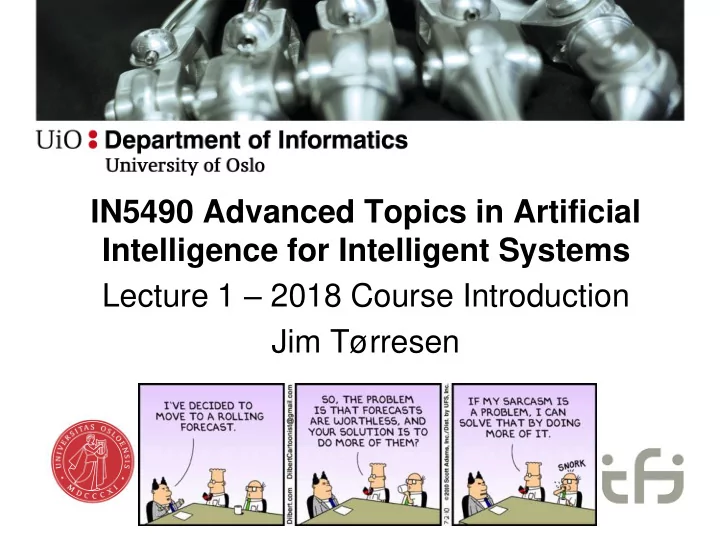

IN5490 Advanced Topics in Artificial Intelligence for Intelligent Systems Lecture 1 – 2018 Course Introduction Jim Tørresen
IN5490 Advanced Topics in Artificial Intelligence for Intelligent Systems Autumn 2018 • Lecturer: – Bruno Castro da Silva – bruno.silva@inf.ufrgs.br (UFRGS) – Charles Martin – charlepm@ifi.uio.no (UiO) – Enrique Garcia Ceja – enriqug@ifi.uio.no (UiO) – Zia Uddin – mdzu@ifi.uio.no (UiO) – Jim Tørresen – jimtoer@ifi.uio.no (UiO) – and more • Lecture time: 27 – 31 August, 15-19 October, 19-23 November • Lecture room: ROBIN pause area • Course web page: 2 https://www.uio.no/studier/emner/matnat/ifi/IN5490/index.html
Topics to be covered in the course • Classification • Recurrent neural networks (RNN) • Deep re-inforcement learning (DRL) • Convolutional Neural Networks (CNN) applied to sensor data analysis • Mobile robotics 3
Learning outcome • insight into the new and promising methods used in artificial intelligence (AI) and machine learning (ML) • have knowledge about how to apply AI methods to different kinds of applications • be able to search for literature outlining state-of-the- art within a specific research field. • be able to critically assess scientific papers and be familiar with how to prepare a scientific paper • be able to design and conduct experiments using AI methods, with emphasis on evaluation • have experience in presenting scientific work 4
Course Layout • Teaching: – Lectures and organized group work in selected weeks – Self study and group work in between sessions • Grading: Pass/not-pass • To pass: – give at least one presentation (one scientific paper) – prepare one research paper draft within each project group (will be considered to be submitted to a conference) – attend at least 80% of all seminar sessions 5
9th Joint IEEE International Conference on Development and Learning and on Epigenetic Robotics 19-22 August 2019, Oslo, Norway Temp. web page: https://icdlepirob2019.wordpress.com Call for Papers/Workshop/Tutorials flyer available 6
Paper review and presentation • Pick one from our list of papers (add your name to it, only one student can present a paper) • https://docs.google.com/spreadsheets/d/1xfIJZyOcUallpB8SF1 4JkpkdNKisC1oa5FSUPpjxwJI/edit#gid=0 • Read and understand the paper content • Prepare a presentation with: – Paper title page heading – Main motivation and idea of method in the paper – Main results – Assessment of strengths and weaknesses 7 • Give a presentation in 10 minutes (Oct or Nov)
Session Plan 27 – 31 August See message at course web page for more details • Monday 14:15-18:00 Course intro + lecture on publishing papers + initial project workshop + pizza • Tuesday 14:15-18:00 2 hours lecture + 2 hours project workshop (select and plan project) • Wednesday 14:15-18:00 2 hours lecture + 2 hours project workshop (work on project) • Thursday 14:15-18:00 2 hours lecture + 2 hours project workshop (work on project) • Friday 14:15-16:00 2 hours lecture 8
Topics for this week • Lectures • Form groups of 3 persons • Select/define a project to work on in the course • Start planning/working on the project 9
Project Implementation • Preferred programming language: Python • Preferred tool: Keras + Tensorflow, Jupyter Notebook, OpenAi Gym • Group size: 3 students • Project proposals: https://docs.google.com/document/d/14LZlb0hmp7j- LPWvEwFeZpB0xV4y-z-84MduhicWuzg • Register group here: https://docs.google.com/spreadsheets/d/1aNMQO7KCxcoRqwXmg2 8ehmKHm-lHpsopwpfHobpmAWw/edit#gid=0 • Register group: Tuesday at the lastest • Register selected project: Wednesday at the latest 10
Robotics and Intelligent Systems group ROBIN Creating systems Robotics and for demanding run- Hardware Intelligent time environments. electronics Systems 3D-printing prototyping Applications Biology robotics apply music principles health from nature ++ Web page : Google for ”ROBIN IFI”
Robotics and Intelligent Systems research 12
Prediction/Forecasting Examples • Nature and society: natural disasters, pandemics, demography, population dynamics and meteorology • Finance : stock market behaviour • Sports : outcome of sporting events • Robotics : More effective operation when human close by • Music : Real-time music synthesis together with real musicians 13
Interaction and User Behaviour using Prediction 14 Why: Responsive and user adapted systems
MECS: Multi-sensor Elderly Care Systems Research Council of Norway grant 247697 Goal: Create and evaluate multimodal mobile human supportive systems that are able to sense, learn and predict future events . Funding: FRINATEK Research Council of Norway
INTROMAT: INtroducing personalized TReatment Of Mental health problems using Adaptive Technology (2016-2021) Goal: Increase access to mental health services for common mental health problems by developing smartphone technology which can guide patients . http://intromat.no Project Manager: Haukeland Univ. Hospital, Bergen Funding: IKTPLUSS Lighthouse, Research Council of Norway
EPEC: Prediction and Coordination for Robots and Interactive Music Research Council of Norway grant 240862. Goal: Design, implement and evaluate multi-sensor systems that are able to sense, learn and predict future actions and events.
What is a Prediction? • Output from a trained supervised model • Confusing in literature: – With or without representing any state in time (temporal data) – Estimate current or future state of a system (temporal model) • A more limited definition (informal speech): Forecasting 18
Temporal and Non-Temporal Data Temporal data is data that represents a state in time • Non-temporal: time-independent data – Text (a set of words rather than sequence of words) – Still Images • Temporal: a consecutive sequence of data – Text (sequence) – Audio – Video – Music – Animation 19 – Human motion
Temporal and Non-Temporal Models x • Non-temporal: consider each input h1 vector independently h2 – E.g. Feed-forward neural networks h3 – Enrique demo x y • Temporal: consider past and current h1 input vector (e.g. using memory or h2 multiple inputs) – E.g. Recurrent Neural Networks h3 – Kai demo y 20
Time Delay Network 21
Machine Learning for Prediction: Machine Learning for Prediction: Training Temporal and Non-Temporal Models Training Temporal and Non-Temporal Models • Non-temporal Classification/Recognition • Feed forward neural networks • Convolutional neural networks • Random forest classifier • SVM, K-NN • Temporal Sequences Prediction • Recurrent neural networks (RNN) • Long short term memory (LSTM) • Hidden Markov Models • Conditional Random Fields • Dynamic Time Warping
Recommend
More recommend